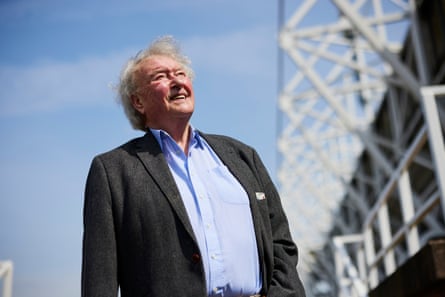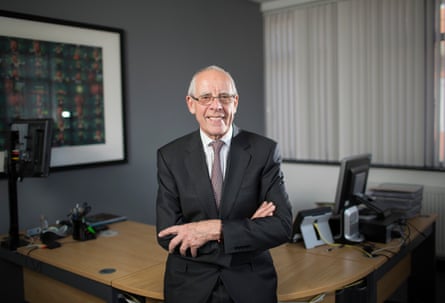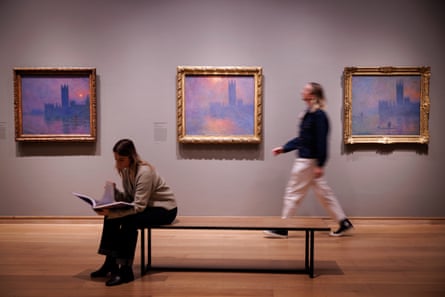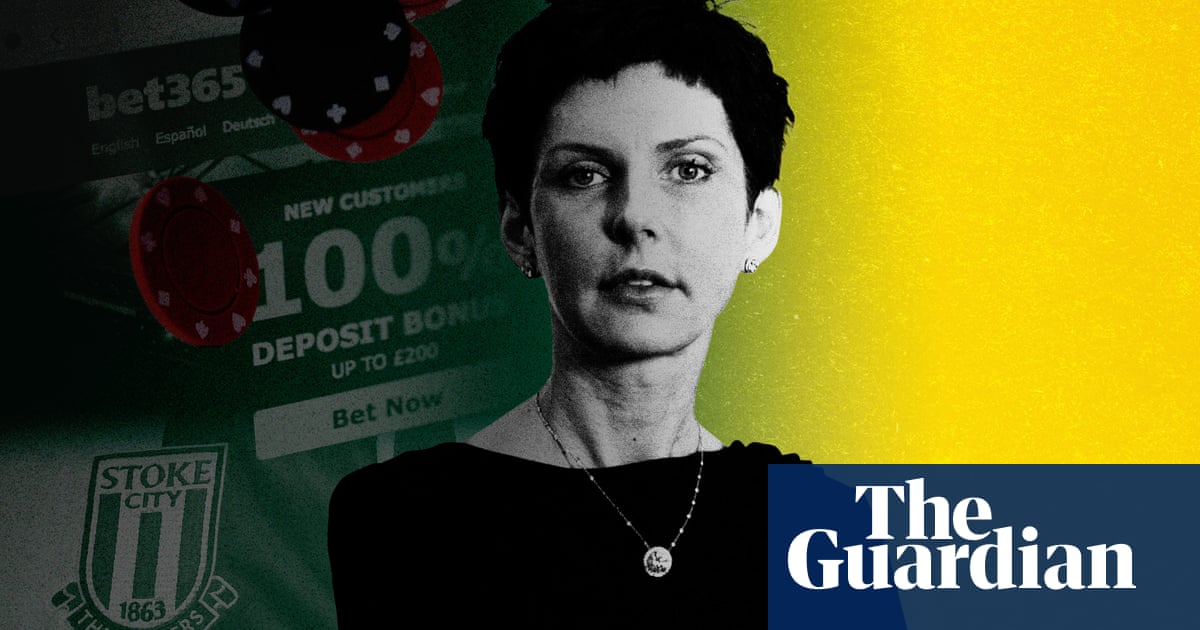She is the mastermind behind Bet365, the company that made it possible to gamble online any hour of the day or night. With a family fortune of £7.5bn, she pays her taxes and donates to charity. But is there a wider human cost to her huge success?
Any motorist or dog-walker traversing the narrow lanes around Denise Coates’ home in Cheshire would most likely stray within range of one of the many CCTV cameras that jut out from the surrounding foliage. These towering hedgerows, interrupted by sturdy security fences, hide not a military base or a top secret research facility but a family home, albeit one of immense proportions.
The 21-hectare (52-acre) estate is large enough to accommodate landing space for the helicopters that neighbours have seen ferrying people in and out. Inside the gates, there is a lake, boathouse, tennis courts, horse stables and a treehouse with a zip wire, according to local planning applications and architectural plans.
The owner of this complex is Britain’s richest woman and the multi-billionaire mastermind behind the Bet365 online gambling empire. Coates’ renown is such that one expert says people in the gambling industry rarely even refer to Bet365, but simply “Denise”. “It’s an indicator of her almost mythical status,” says Alun Bowden, a gambling consultant at Eilers & Krejcik Gaming, which provides research for the industry. “Nobody tries to copy her, because there is no point. You can’t. She’s unique.”
Coates’ status has not deterred unkind comments from some neighbours. One says her home looks like a Tesco Extra superstore. No, says another, it’s “more like an Aldi depot”.
All in all, the house and grounds in which Coates, her husband and their five children live are estimated to have cost close to £90m. Building began in 2019 and did not stop until this year. The project was overseen by the practice of renowned architect Norman Foster, the man behind London’s Gherkin, Wembley Stadium and Berlin’s Reichstag. It hasn’t won Coates too many friends in the area. Months of road closures have infuriated drivers and horse-riding enthusiasts. One local, who described the work as a “pain in the arse”, says: “At least she retarmacked the road – but she could have brought round a bottle of wine.”
Still, there were millions on the table for neighbours who were willing to sell up. Coates spent more than £8.5m buying surrounding land so she couldn’t be overlooked – and many local farmers took the money. However, Coates is shrewd. One neighbour says they ended up in a stalemate with her after refusing a bid for their land. “She’s a clever woman,” they said. “She’ll offer more than it’s worth but not 10 times more.”
However, other than those directly affected by Coates’ building work, there aren’t many people in and around Stoke-on-Trent with a bad word to say about her. Stoke is an agglomeration of six towns that once sat at the heart of the global pottery industry, home to Wedgwood, Portmeirion and Spode. Ceramics delivered prosperity to the region in the 18th century, while coal and steel brought more growth as the Industrial Revolution progressed. But the slow decline of British industry saw the boom times vanish and Stoke declined with it. The emergence of Bet365 has been one of the city’s rare recent success stories.
Bet365 “directly and indirectly” supports about 12,000 jobs in the city, says Mark Gregory, a former chief economist at global accounting giant EY, who was born and raised in Stoke. His estimate includes jobs at Stoke City football club, which is owned by Coates’ brother John. That’s about “10% of employment”, he says. “And because it’s a higher-wage company, even more than that in terms of value.”
“They’re a huge generator of wealth locally,” says Jeff Nash, who owns the local office and hospitality complex Potbank, on the site of the former Spode pottery factory. “If you’re a graduate, you can look at Bet365 and want to stay in Stoke. That’s the future.”
Andy Jackson, who runs creative agency i-Creation from an office in Potbank, praises the work Coates has put in to improve maths skills in the city, including funding for a scheme to attract maths teachers in partnership with the council. “She was really clear about 10 years ago that for Bet365 to have a talent pool to work for them, numeracy was important. They put their money where their mouth was.”
But perhaps the most reputation-enhancing investment the Coates family made was when they bought Stoke City FC for £1.7m in 2006. It has always been very much a family affair: Peter was joint chairman with Denise’s brother John, until a restructuring that saw John take full control of the club this year. Denise’s husband, Richard, is responsible for the stadium and training ground. The family’s smart stewardship and financial muscle helped elevate Stoke up a division to the Premier League in 2008, where they stayed for a decade before relegation in 2018. The Coates family does not just bankroll the team – it even pays for free travel for fans who want to attend away games.
Few of those fans will have followed Stoke for longer than 81-year-old Nigel Johnson, a former schoolteacher turned football commentator who covered Stoke for the BBC over more than five decades until his retirement last year. Johnson says he is grateful for the “fantastic amount of money” that the Coates family has pumped into the club he loves.

But it is more than that. “When I watch cricket from Cape Town or Sydney, I see the Bet365 logo flashing round the stadium and it’s like it’s Stoke’s name up in lights,” he says.
Denise Coates was born and bred in the Stoke area, and the seat of her family power remains here, in the shape of a sparkling, 2,400-seat headquarters proudly displaying the Bet365 name to passing traffic, as it rises from the centre of a sprawling complex that also includes a training centre.
Coates was 33 when she began building her online betting empire in 2000 from a portable building in a car park in the city. Within a few years she transformed the British gambling landscape, recognising that the future lay not in high street bookies but online – allowing users around the world to place bets at any hour of day or night, every day of the year. Perhaps her biggest coup was Bet365’s development and perfection of in-play betting, a product that invites punters to wager in real time on minute-by-minute action, such as who will win the next corner in a football match, or the next point in a game of tennis. It is now the most ubiquitous form of online gambling.
It has certainly made Coates rich. Together with her family, the 57-year-old is estimated to be worth £7.5bn, according to the latest Sunday Times Rich List. She is almost as famous for her record-breaking pay packets as her entrepreneurial talent. In 2021, she took home £469m. This year, it was £271m. In total, she has extracted about £2.5bn in pay and dividends from the company.
Denise was, from a young age, very good with numbers. David Owen, who taught Coates maths in the 1980s at Sandbach High School, told the BBC that she was a “top-of-the-range” student. “If we were talking Mensa, she’d be in the top 1% … She was going somewhere.”
Her father, Peter, the son of a miner, was a moderately successful local businessman who made his money in the catering industry, serving up burgers and pies to hungry fans at football stadiums (Coates’ mother, Deirdre, is a director of the family catering business now). Peter also owned a string of betting shops – Provincial Racing – where Coates worked during her holidays. It was here that she honed her business acumen, working as a cashier and gaining an intuitive understanding of how bets were priced and what kept punters coming back.
She graduated from the University of Sheffield with a first-class econometrics degree and returned to Stoke, where she sought to move her dad’s gambling business online. She bought the domain name Bet365.com from eBay for $25,000, borrowed £15m against the Coates family’s bricks-and-mortar stores, and invested it all in sports betting technology.
By 2005, Bet365 had sold off its high street shops – for £40m – to focus entirely on its web offering, which would expand beyond sports betting to casino games such as roulette and digital slot machines. The timing could not have been better. First, Labour introduced a broadly permissive overhaul of Britain’s gambling laws in 2005, triggering a surge in marketing and advertising that dragged betting out of the realm of smoke-filled bookmakers and firmly into the mainstream. The arrival of the smartphone – the iPhone hit the market in 2007 – would soon put a casino in every pocket.

Before long, Bet365.com was bringing in punters in their droves, leaving established but slower-moving rivals such as Ladbrokes and William Hill struggling to catch up. In the 2006-07 financial year, the last before Labour’s reform of gambling laws took effect, Bet365 booked revenues of £91m. By 2012, the year Coates was awarded a CBE for services to the community and business, they had reached £648m. Last year, it soared past the £3bn mark. Savvy marketing helped it along its way, especially the ubiquitous slots during football broadcasts, featuring the actor Ray Winstone, who began urging fans to “Bet in play, now” in 2009.
The company no longer discloses how many wagers are placed on its products, but the last time it did, in 2018-19, £64bn worth of bets were made worldwide in just one year. The Gambling Commission estimated the total volume of all online wagers placed in Britain that year at £118bn.
Head just one mile north of the Bet365 headquarters on the A53 and you will come to the West Midlands Gambling Harms Clinic. Here, wedged into a few low-ceilinged rooms of a community health centre, experts sift through the human wreckage left behind by companies such as Bet365. There may be more than a million people with a gambling problem in Britain, including 55,000 children, according to estimates. Punters’ losses, worth £11bn a year to the gambling industry, are disproportionately skewed towards more economically deprived areas, such as Stoke.
The clinic in Stoke opened in October 2022, part of a nationwide rollout of new NHS clinics for people suffering from addiction and other gambling-related harm. Demand for their services has risen dramatically in recent years. During the Covid-19 pandemic, the NHS warned that it was being left to “pick up the pieces” of the gambling industry. Experts have been particularly vocal about the boom of online gambling, in particular in-play betting and products such as digital slot machines, which are designed to deploy an arsenal of psychological tricks to boost profits.
“These features have been called ‘addiction by design’,” says Prof Heather Wardle of the University of Glasgow, one of the UK’s leading experts on gambling-related harm. “The features which make these games so immersive are the same features which make them harmful.” According to Citizens Advice, some 18% – or 3.3 million – of online gamblers in Britain are in debt, owing £10,000 on average. In 2021, Public Health England estimated that there are 400 gambling-related suicides each year in England alone: more than one every day.
I meet Mark on a Zoom call at the Stoke gambling harms clinic, where he is a client. He is in his late 30s, and came into some money after he and his ex-wife divorced and sold their home. He had always gambled in bookmakers but during the pandemic, when shops were shut, he started gambling online, something he’d never done before. He soon found that the online experience was far more intense. “It’s the casino in your pocket that never goes away. You can do it on the toilet, at work, on your lunch break, at home while watching TV, in bed when you wake up. So Covid didn’t help because I needed the escape.”
For a gambling problem to start to become an addiction, “you need time, you need money and you need opportunity,” he says. “Now I had all three, it was a recipe for disaster.” The exact amount Mark lost over the course of 18 months, is irrelevant, he says. “It was tens of thousands, but if I’d had a million I’d have gambled that. I would lose a month’s salary in a few minutes.”
At the time, he and his new partner were each saving for a deposit on a house together. Mark lost the lot. Telling her that the money was gone was “the hardest thing I’ve ever done, including watching my dad die. Her initial reaction was shock because she didn’t understand. Not one single other person knew … Gambling wants you on your own. It was the dirty little secret.”
Clinics such as the West Midlands one where Mark is being treated have a colossal task on their hands to mop up the industry’s collateral damage. The annual budget for all 15 new NHS clinics is just £6.75m. Or, to put it another way, less than a day’s worth of revenue at Bet365.
Sammy, also in his late 30s, is another client here, and a former customer of Bet365, among other operators. Sammy grew up surrounded by gambling, whether it was horse racing, 2p pushers at the funfair or fruit machines in the pub. But it was online casino games that tipped him over the edge. “I opened accounts in my mum’s name, my dad’s, my brother’s. I had credit cards with different limits,” he says. “When you’re a gambler, you’ll find a way.”

Sammy’s particular favourite was online games of blackjack – he loved the thrill of winning or losing within a matter of seconds. “ I remember the excitement of having £5,000 at the tip of my fingers. I used to kid myself that I could turn it into £50,000.”
Like many gamblers, Sammy tried to quit. But gambling companies know what works to retain customers. One of the most controversial tactics online businesses offer is “free” spins and bonuses. “They’d do everything and anything they can to keep you gambling. And you think it’s fine because you’re not using your own money, but then you do start using your own money.
“I joined about 20 to 25 companies because they’d match your deposit. My thought process was that if I join 10 companies and deposit £50 into each, I’ve doubled my money straight away. And that’s how they entice you in.”
One month, Sammy used his month’s salary to build up winnings of about £2,000. Inevitably, he lost it. “I used both mine and my wife’s wages to get it back. And then I lost that. I remember thinking: I’ve got no funds, I’m going to have to tell my wife. There was nothing left for the month … I’d have to take out another loan.” It was a Sunday night and his wife was giving their two young children a bath. “My heart was pounding out of my chest. I thought: ‘It’s now or never.’ I couldn’t find another way out. I just said: ‘I’ve got a gambling addiction.’”
Sammy is benefiting from treatment at the West Midlands clinic but still finds it hard to escape the relentless bombardment of gambling adverts. A massive Liverpool FC fan, he is surrounded by club memorabilia when we speak online. He believes he sees more gambling advertising because of his online activities. “I see it on Twitter all the time – famous footballers doing ads for bookmakers. You think you can get away from it, but it’s everywhere. Join now and get a bonus boost, or whatever.”
The gambling industry, and Bet365 in particular, has targeted football relentlessly. Gambling adverts saturate TV, radio and podcasts and scroll relentlessly across pitchside hoardings in stadiums. Most clubs now have an official betting partner and some have even taken a cut of fans’ losses under commercial arrangements with sponsors. The demographic, young and male, also happens to be the cohort most likely to suffer from a gambling addiction – not just the fans but the players, too.
Some players have no choice but to wear betting companies’ logos on the front of their shirts, despite several high-profile cases of star footballers – from Michael Owen to Wayne Rooney – speaking publicly about their struggles with gambling addiction. Nowhere is the symbiotic relationship more evident than at Stoke City FC, which is owned by the Bet365 group and plays at the Bet365 stadium, where the players run out with Bet365 emblazoned across their chests.
Bet365 may be hard to escape in Britain, particularly for football fans, but Denise Coates keeps a much lower profile. The last time Britain’s most successful businesswoman gave an interview was to the Guardian, 12 years ago. She does not often make public appearances or speak at business conferences. Bet365 is a private business, so there are no annual shareholder meetings. The rare times she is seen are in publicity images announcing donations made by her charity, the Denise Coates Foundation. And so this vacuum of information has been filled by myth-making.
One oft-repeated line features an Aston Martin DB9 sports car, with a personalised number plate, that is sometimes spotted in the Bet365 car park. The car appears in almost every written profile of Coates, a totem for a billionaire’s apparent flamboyance. However, according to one person close to Coates, who has asked not to be named, the story is “completely untrue”. The car does exist, but it is not hers – it’s a close family member’s. “She likes being anonymous,” says the source. “The idea she’d have an Aston Martin with DC365 on the numberplate, driving around Stoke, is so far opposite of what she’s like. She’s a very low-profile sort of person.”
In many ways, Coates is a woman of multiple contradictions. On the one hand, she is a poster child for corporate excess, with her staggering pay packets. On the other, she is one of Britain’s biggest taxpayers – choosing to put most of her vast income through Bet365’s payroll rather than hiding it away from tax authorities like many other billionaires.
To some, she has built her vast fortune creating and marketing blatantly addictive gambling products, shattering the lives of punters and their families. And yet she puts a considerable amount of her company’s profit into charities and her local community, funding school numeracy programmes and generating high-paying jobs in a city that lacks alternative sources of wealth and skills.
She is known as a formidable entrepreneur who, in a male-dominated industry, can easily “hold a room of grown men”, according to one source. And yet those who have worked for her for decades say she is a considerate manager to her employees, and “genuinely cares about them and supports them”.
Her politics, too, might surprise some observers. Coates is not the type to pontificate on politics, according to one person who knows her. However, records show her father and companies within the Bet365 group have given a combined £480,000 to Labour over the years, starting with £50,000 in 2004, the year before Labour finalised the details of the Gambling Act. More recently, Peter Coates gave £25,000 to Starmer’s leadership campaign.
In the months leading up to the UK’s Brexit referendum in 2016, Bet365 gave £512,500 to the campaign for Britain to remain in the EU. Neither the Coates family nor the company has spoken publicly about this donation.
Bet365 has made friends in the Conservative party, too. In 2022, the then Stoke-on-Trent North MP, Jonathan Gullis, was forced to apologise to the chair of a Westminster Hall debate on gambling harms after admitting not only that he was reading directly from a Bet365 briefing paper in parliament, but also that he had failed to declare £540 worth of tickets he had received from the company that year to see Stoke City play Fulham in the Championship, a competition sponsored by another betting company, SkyBet.
Aaron Bell, formerly the Conservative MP for Newcastle-under-Lyme, had an even closer relationship with the company. He worked for Bet365 from 2006 until he won a parliamentary seat in 2019 – and called for caution over proposed reform of the gambling industry in parliament, until he stood down in 2024.
During the same Westminster Hall debate on gambling-related harm, Bell insisted that he was “not a spokesperson for the gambling industry” but went on to list Bet365’s virtues, including its record of going “above and beyond” on safer gambling measures, its roots in the Stoke community and Coates’ tax contribution.
The family’s tax bill is something of a source of pride – and potential political leverage. The company’s submission to a select committee inquiry in 2023 read: “Our founders are the second highest taxpayers in the UK.” Not everyone is impressed by this. As Scottish National party MP Ronnie Cowan put it in the Westminster Hall debate: “If I earned a billion pounds, I would make sure I paid my tax as well.”
While Coates and her family had dropped to third place on the most recent Sunday Times tax list, they are still estimated to have paid £376m to the exchequer last year. A sizeable chunk of that contribution comes from Coates’ enormous pay packets, which she puts through Bet365’s payroll, meaning she gets taxed at the 45% additional rate of income tax.
“That is very different from many of Britain’s billionaires,” says Luke Hildyard, director of the High Pay Centre. “That said, that level of wealth remains unsettling. It’s far beyond what any reasonable person might consider a fair or proportionate reward or incentive for business success.”
Liz Ritchie and her husband, Charles, set up the charity Gambling With Lives in 2018 after they lost their son Jack to suicide when he became addicted to gambling, first in bookies and later online. The charity seeks to help other people bereaved through gambling addiction and is a key campaigner pushing for reform to online gambling.
“Addiction underpins the industry’s business model,” says Ritchie. “The most addictive products, such as online slots, are aggressively marketed, and income from these has grown by 8.5% over the past year. Meanwhile, gambling suicides continue every day. How have we ended up in a situation where gambling companies thrive by putting the public in such danger?”
Despite being in recovery from gambling addiction, Sammy says he still gets “loads of text messages from gambling companies. I have to delete and report them. It feels like your phone is being tracked or monitored.”
Indeed, many gambling firms have fallen foul of the Gambling Commission regulator over their apparent failure to use the wealth of information they hold about people like Sammy to prevent harm. In 2022, SkyBet was fined £1.2m for sending promotional messages to gamblers who had signed up for a voluntary self-exclusion scheme to block themselves from betting sites.
Bet365 has felt the wrath of the regulator less often than many of its rivals, but it is not blameless. In April, it agreed to pay £582,120 for failures in its anti-money laundering and social responsibility checks – which included a failure to deploy its technological prowess to stage “meaningful” interactions with customers who might be suffering harm.
“You’re supposed to be a loyal customer,” says Sammy. But gambling firms “don’t give a toss about you. They just want you to keep playing.”
Coates has established a reputation as a very generous woman. The Denise Coates Foundation was set up in August 2012. According to the charity’s regulatory filings, she has put about £752m into it. Recipients of the foundation’s cash include Stoke’s Douglas Macmillan hospice (known locally as the Dougie Mac), numerous medical research and treatment projects, disaster relief funds and university bursaries for people from economically disadvantaged backgrounds.
There are artistic endeavours, too. The New Vic theatre in Newcastle-under-Lyme, just outside Stoke, is a regular beneficiary, while Coates also funded Tate Britain’s purchase of four watercolours by the women’s rights campaigner Sylvia Pankhurst, marking the centenary of women’s suffrage in 1918. London’s Courtauld Gallery features a space that bears Denise Coates’ name.

Charities addressing gambling-related harm are not listed among the beneficiaries of the foundation’s largesse, however, although Bet365 does fund such services through other means, including a voluntary industry levy.
Some recipients of the foundation’s charity are close to home. At least £700,000 has gone to the Hassall Green Nature Reserve in Cheshire. Keele University and the Sandbach Gymnastics Foundation both boast a Denise Coates Foundation Building, the name of their benefactor writ large on the external walls. Coates may abhor the spotlight but where her philanthropy is concerned, she is less shy about leaving her mark.
Coates’ foundation has donated several times to the Catholic Agency for Overseas Development (Cafod), the official aid agency of the Catholic church. One person who has spent time with Coates says they have never seen her display any outward sign of religious sentiment, but her grandfather Leonard, a veteran of the first world war, was a Catholic. The Catholic Herald lists Peter and Denise Coates among the faith’s “leaders of the day”.
The Denise Coates Foundation has actually donated a relatively small proportion of its reserves – about £78m – since 2013, while amassing an endowment fund of £730m through cash injections from companies in the Bet365 group. In its accounts, the charity puts this down to a policy of ensuring that it earns enough through investments to make sure the charity is self-sustaining and not “dependent on donations from any one source”. That point of self-sufficiency might have been reached sooner, were it not for the fund losing £26.8m in the last financial year as a result of the poor performance of its investments.
The foundation’s strategy is unlikely to be called into question, though. Every one of its trustees is a member of the Coates family, or one of their employees.
The charity may come with more benefits to Coates than the warm glow of altruism. Guardian analysis suggests that her philanthropy may have helped save the Bet365 group £140m in tax, far more than the foundation has yet donated to good causes.
Where next for Coates? The Bet365 juggernaut certainly shows no signs of slowing down. From that portable cabin in a car park, Coates has pieced together an empire that stretches from Stanley Matthews Way in Stoke to Sydney, with offices in Frankfurt, Bogotá and Sofia. Now, she has her sights set on perhaps her biggest conquest yet: the US.
The growth of US sports betting has been meteoric since 2018, when the Supreme Court overturned a 1992 federal law that had essentially banned the practice. Predictably, Coates moved fast – Bet365 is now available in 10 states with a combined population of more than 85 million people. Some analysts have predicted that California, one of 12 states where sports betting remains illegal, would be a bigger market than the whole of the UK. The Coates territory has plenty of room to grow.
Bet365 refuses to disclose the geographical breakdown of its earnings, claiming it would be “prejudicial” to its interests. But as one person familiar with the company’s operations put it: “If you don’t have to declare the geographic breakdown of your business, why would you?”
As the Guardian revealed in 2014, Bet365 appears to make significant income from China, categorised as a “grey” market in the gambling industry, because betting is a criminal offence there. Indeed, the Guardian also reported that some Bet365 customers had been arrested after apparently placing bets on the Bet365 website, while bloggers who promoted the company were jailed.
The company faced no repercussions, perhaps because, as Bet365 pointed out at the time, it does not have any physical assets or staff in China. And, as a digital business with cross-border reach, it is able to stay well out of the range of any effort at enforcement action by Beijing, which has cracked down hard on domestic betting businesses.
Meanwhile, Bet365 continues to recruit Chinese speakers for its call centres in Stoke, according to job adverts posted online. It appears to look after them well, too. Land Registry records show that the company owns a vast property empire in Stoke, comprising more than 71 separate land titles, some of which are residential addresses where, according to locals, some of its imported personnel are housed. With China offering more than 1 billion potential customers, housing for a few call centre staff may be a small price to pay.
This approach – identifying a lucrative goal and then going hell for leather in pursuit of success – epitomises the ethos that has underpinned the Denise Coates story. “It’s what Bet365 do: they are like a patient, aggressive poker player,” says Bowden. “They think long and hard, and when they make their minds up that this is a good value bet, they go all in.”
Coates herself put it more succinctly in her 2012 interview with the Guardian: “We were the ultimate gamblers, if you like.”
In the UK, support for problem gambling can be found via the NHS National Problem Gambling Clinic on 020 7381 7722, or GamCare on 0808 8020 133. In the US, call the National Council on Problem Gambling at 800-GAMBLER or text 800GAM. In Australia, Gambling Help Online is available on 1800 858 858 and the National Debt Helpline is at 1800 007 007
